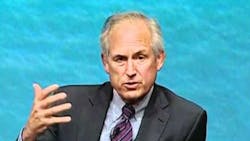Survey: Slow Recovery, Threat of 'Fiscal Cliff' Dim CEO Optimism
CEOs of U.S. companies foresee slower economic growth ahead, and have lowered their expectations for sales, capital investment and hiring compared with last quarter, according to the results of the Business Roundtable's latest CEO Economic Outlook Survey.
"While expectations are for a continued slow expansion, the results reflect member CEOs' continuing concern over obstacles to a stronger economic recovery," Boeing Co. CEO Jim McNerney told reporters Wednesday during a conference call.
McNerney, who is chairman of the association of U.S. chief executives, said CEOs are especially concerned about the prospect of the Obama administration and Congress averting the "so-called 'fiscal cliff' of expiring tax rates, debt ceiling and budget sequestration."
"Failure to resolve these tax and spending questions along with continuing concern about the eurozone and questions about economic growth in Asia certainly act as a drag on potential economic growth and business expansion in the U.S.," McNerney added.
In the case of Boeing (IW 500/15), McNerney noted that the threat of sequestration -- spending cuts that would be triggered in January if lawmakers fail to cut the federal budget deficit -- already has forced the aerospace firm to delay hiring and "trim employment in certain places."
"And I think a number of companies are doing that," McNerney said. "We're trying to minimize [job cuts], but there's no way to approach the prospect of sequestration without hedging a bet. There is no way."
Asked by a reporter to offer more detail on Boeing's workforce cuts, McNerney replied: "Let me just say there are employment adjustments downward that are significant in anticipation of sequestration. Let's just leave it at that."
'An Imperfect Solution' Better than Nothing
The second-quarter survey -- conducted between mid May and early June -- asked U.S. CEOs to give projections for their firms' sales, capital spending and hiring over the next six months.
Some 75% of the 164 CEOs who responded said they expect their companies' sales to increase over the next six months, down from 81% in the first-quarter survey.
The percentage of CEOs anticipating that their firms will increase capital spending (43%) dropped by 5% from the first-quarter survey, while the number of CEOs expecting to boost hiring (36%) dropped by 6%.
Based on those survey results, the Business Roundtable's composite index of CEO expectations for the next six months dropped from 96.9 in Q1 to 89.1 in Q2, although McNerney noted that a reading above 50 indicates expansion.
The bottom line, perhaps, is that while the U.S. economy is slowly gaining steam, there's enough uncertainty emanating from Washington and Europe that CEOs are becoming increasingly jittery about the future.
"The past quarter has seen continuing concerns about Europe's sovereign-debt issues, as well as continued political wrangling in D.C. that is holding up much-needed tax and fiscal reforms that would provide greater certainty to business, reassure the markets and enhance U.S. economic growth," McNerney said in his opening remarks.
Later in the call, McNerney asserted that the sovereign-debt crisis in Europe is a much bigger concern than the specter of slower growth in China, adding that "the European situation could decelerate quickly."
"We hope it doesn't, but I think it has a greater possibility to decelerate quickly, whereas in China the issue is more 6% growth as opposed to 9% growth for a while, which would be less of a concern longer term," McNerney said.
It was clear throughout the call, however, that the need for Washington to get its fiscal house in order is the more pressing macroeconomic issue for America's CEOs.
Anything short of concrete action in Washington would simply prolong "the limbo that we find ourselves in today, which causes us to hedge our bets with investment and employment," McNerney said.
"And so we would all advocate for an imperfect solution over waiting forever for a perfect solution," he added.
See Also:
About the Author
Josh Cable
Former Senior Editor
Former Senior Editor Josh Cable covered innovation issues -- including trends and best practices in R&D, process improvement and product development. He also reported on the best practices of the most successful companies and executives in the world of transportation manufacturing, which encompasses the aerospace, automotive, rail and shipbuilding sectors.
Josh also led the IndustryWeek Manufacturing Hall of Fame, IW’s annual tribute to the most influential executives and thought leaders in U.S. manufacturing history.
Before joining IndustryWeek, Josh was the editor-in-chief of Penton Media’s Government Product News and Government Procurement. He also was an award-winning beat reporter for several small newspapers in Northeast Ohio.
Josh received his BFA in creative writing from Bowling Green University, and continued his professional development through course-work at Ohio University and Cuyahoga Community College.
A lifelong resident of the Buckeye State, Josh currently lives in the Tremont neighborhood of Cleveland. When the weather cooperates, you’ll find him riding his bike to work, exercising his green thumb in the backyard or playing ultimate Frisbee.
